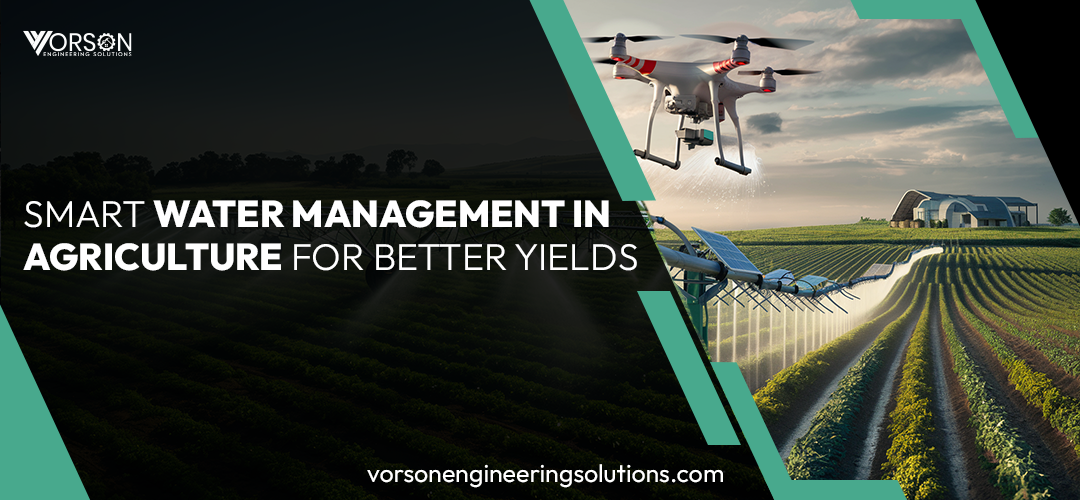Water Management in Agriculture has become increasingly important as farmers seek to maximize their crop yields while conserving water. Using the correct method can help water to be used more effectively, thereby promoting better plants and more output. The lifeblood of agriculture, water is vital for the expansion of crops. On the other hand, inappropriate use of water resources may cause inefficiency, failed crops, and long-term environmental damage. In contemporary farming, water management is not only about guaranteeing crops have enough water it’s about managing water efficiently to optimize yields while preserving this valuable resource.
What is Smart Water Management?
To maximize water use in agriculture, smart water management combines cutting-edge technologies, conventional wisdom, and Geotechnical Engineering solutions. Unlike more traditional approaches, smart water management minimizes waste and maximizes efficiency by concentrating on providing the correct amount of water at the correct moment to the correct place.
Key Components of Smart Water Management
Precision Irrigation
Micro-sprinklers and drip irrigation let water be applied precisely right to the plant roots, therefore lowering runoff and evaporation.
Real-time Monitoring
Using soil moisture sensors and weather forecasting technologies enables farmers to make educated decisions regarding when and how much to water their crops.
Automated Systems
Automated irrigation systems guarantee consistent field distribution of water, thereby altering depending on the requirements of the plants.
Importance of Smart Water Management
Smart water management in agriculture determines both guarantees of sustainable farming and increases in agricultural yields. Good water management helps farmers prevent water wastage, reduce the chance of soil erosion, and preserve the health of their crops. Appropriate irrigation techniques can significantly influence the plant growth cycle, therefore boosting the output and quality of the generated items. For example, drip irrigation systems can direct water straight to plant roots, therefore reducing evaporation and runoff.
Geotechnical Engineering Solutions in Water Management
Geotechnical Engineering plays a vital role in enhancing water management systems in agriculture. Engineers can create effective irrigation systems that maximize water consumption using analysis of soil characteristics, slope stability, and other environmental elements. In places with difficult terrain where conventional irrigation systems could not be sufficient, geotechnical engineering solutions especially help. For instance, terracing and contour farming are methods of land contouring meant to better control water flow and lower erosion. These techniques not only save water but also enhance soil quality, therefore strengthening the basis for more strong crop development.
Techniques for Better Water Management
There are now several methods accessible that increase water management’s efficiency:
Drip Irrigation
By delivering water straight to the plant roots, drip irrigation helps to lower water loss by evaporation. In places with limited water supplies especially, it is quite helpful.
Soil Moisture Sensors
These technologies, which enable farmers to monitor the water requirements of their crops, help to guarantee that water is only used when required.
GIS Mapping
Geographic Information Systems (GIS) mapping of fields helps farmers to better grasp the water requirements of their land and modify their irrigation methods.
These methods together with conventional knowledge can greatly increase water use efficiency. Technology’s introduction has transformed agricultural water management. Modern methods such as automated sprinklers, smart irrigation systems, and soil moisture monitors enable more effective use of water. Based on weather forecasts and soil moisture levels, smart irrigation systems for instance can be set to water crops at ideal times. By guaranteeing the correct dosage of water at the correct moment, this precision irrigation reduces waste and increases output.
Challenges in Smart Water Management
Modern water management systems present problems even if they have many advantages. Some of the obstacles to applying effective water management systems in agriculture are high expenses, lack of technical knowledge, and the necessity of infrastructure development. Nevertheless, the acceptance of Geotechnical Engineering solutions and the incorporation of contemporary technologies will help to solve these difficulties.
For example, although the initial setup cost for a smart irrigation system could be significant, the long-term water savings and higher crop yields would exceed the expenditure. Government incentives and training courses can also enable farmers to embrace these new technology and go over obstacles in smart water management.
Solutions for Smart Water Management
Smart Irrigation Controllers
These smart irrigation controllers automatically modify irrigation schedules based on data from soil sensors, weather forecasts, and plant requirements, therefore guaranteeing ideal water utilization.
Drones and Satellite Imagery
Farmers are increasingly tracking crop health and water distribution over sizable fields using drones and satellite imagery. These instruments provide more focused irrigation by pointing up locations that call for either more or less water.
Water Recycling Systems
In some farming operations, water used in irrigation is gathered, processed, and recycled, so lowering the total water demand and supporting sustainability.
Aquaponics and Hydroponics
Compared to conventional farming methods, aquaponics and hydroponics soilless farming systems require much less water. Fish tank water is utilized in aquaponics to feed plants, therefore forming a closed-loop system that helps to save water.
Smart Water Management for a Sustainable Future
In agriculture, smart water management goes beyond mere water conservation to include managing it in a way that maximizes agricultural output and maintains the environment. Farmers may increase yields and help to create a more sustainable agricultural future by combining contemporary technologies with geotechnical engineering solutions. The need of smart water management in agriculture cannot be emphasized as we still have to deal with world issues including water shortage and climate change.



